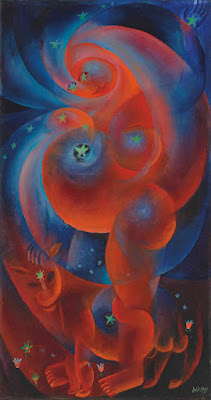By
Peter Parker
Otto Dix
In Berlin he would work on a second novel, The Memorial, which further explored the gulf between the generations caused by the war and was admired by EM Forster among others. It was, however, the novels he wrote about Berlin, Mr Norris Changes Trains (1935) and Goodbye to Berlin (1939), that made his reputation as one of the leading writers of his generation, providing an indelible tragic-comic portrait of a city teetering on the brink of catastrophe as Hitler gained in popular support.
While Isherwood, who was born on 26 August 1904, was attracted to Berlin by the ready availability of homosexual partners there, he always had a keen journalist’s instinct for being in the right place at the right time. “Here was the seething brew of history in the making,” he wrote, “a brew which would test the truth of all the political theories, just as actual cooking tests the cookery books. The Berlin brew seethed with unemployment, malnutrition, stock market panic, hatred of the Versailles Treaty and other potent ingredients.”
Isherwood’s Berlin novels portray this history-in-the-making at street level, showing how ordinary people were affected. Isherwood’s sharp eye for physical detail and human oddity means that his characters are never merely representative of their class or condition, but leap off the page and live on in the memory. And in the feckless cabaret singer Sally Bowles (on whose story the stage musical Cabaret was later based) he created one of literature’s immortals.
Isherwood’s lasting attraction as a writer, apart from the unfading crispness and sheer readability of his prose, is that he encompassed a century. Although born into the Edwardian age in 1904, he still seems strikingly modern. He may have effectively left England in 1929, but he took his Englishness with him, becoming, as he put it, “a permanent foreigner”. He recognised that being an outsider wherever he went, both nationally and sexually, gave him an invaluable perspective as a writer.
Having fled Berlin in May 1933, he spent the next few years trailing around Europe with his young German lover Heinz Neddermeyer in search of a country in which they could settle without being harried by immigration officials and the Nazi authorities. Heinz was eventually imprisoned for draft evasion and sexual offences, after which Isherwood travelled to China as a somewhat improbable war reporter with his friend WH Auden. The two emigrated to America in 1939 and Isherwood settled in California. He worked with leading directors in Hollywood, became the disciple of a Hindu guru long before hippies followed in The Beatles’ footsteps to India, and ended up a figurehead of the Gay Liberation movement. He died in 1986.
Every step along the way is recorded in the books he wrote, so that reading Isherwood gives one a real sense of what it was like to live through the 20th century, a century characterised by wars, the clash of ideologies, widespread deracination and massive social change.
Isherwood, who died on 4 January 1986 aged 81, was celebrated in 2011 in Kevin Elyot’s adaptation for BBC "Two of Christopher and His Kind," Isherwood’s memoir of his life in the thirties, published in 1977. Taking advantage of the new freedoms resulting from gay liberation, Isherwood not only placed his homosexual experiences back at the centre of his Berlin life in this book, but went on to describe his further travels throughout what Auden described as “a low dishonest decade”. As in Goodbye to Berlin, this is a personal story played out against and driven by history. The familiar refugee experience is given a novel twist, however, for it is sexuality rather than race that forces Isherwood to seek another homeland. The book ends hopefully with him setting sail for America, like many European émigrés; and it is here that a whole new chapter of his life and work will open.
Credits: This article originally appeared in 2015 in The Telegraph.


No comments:
Post a Comment